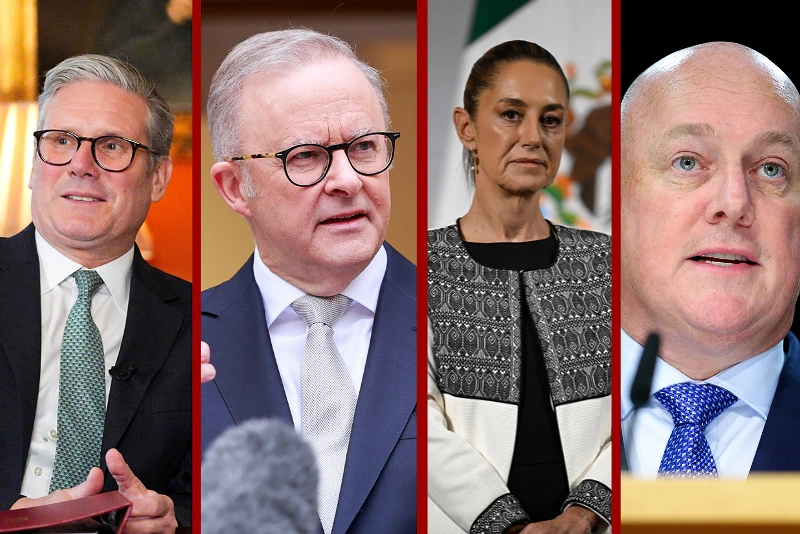
OAN Staff Blake Wolf
11:20 AM – Wednesday, April 2, 2025
World leaders across the globe have continued to respond publicly to President Donald Trump’s tariff announcements—with some issuing threats of retaliation, while others expressed disappointment or gratitude.
Advertisement
On Wednesday, President Trump introduced a 10% baseline tariff on all imports, as well as reciprocal tariffs based on what each nation imposes on the U.S.
Soon after, several allies expressed their disappointment with Trump’s new policy, while simultaneously expressing their interest in engaging in negotiations with the United States.
UK Prime Minister Keir Starmer responded to the tariff announcement by vowing to “continue to negotiate on a deal in our interest.” Starmer did not criticize President Trump’s actions, instead stating that Trump is following through on acting on “his mandate.”
Additionally, Australian Prime Minister Anthony Albanese expressed gratitude by admitting that “no one got a better deal” than Australia — but he still characterized the move as a hostile act. With just 5% of Australia’s exports sent to the U.S., it would have a limited direct impact on the domestic economy.
Australia just received a 10% blanket tariff, but Albanese was still quick to criticize the initiative, despite acknowledging his country’s easy tariff deal. Albanese argued that Trump’s tariffs “have no basis in logic.”
“President Trump referred to reciprocal tariffs. A reciprocal tariff would be zero, not 10%,” Albanese stated. “The administration’s tariffs have no basis in logic and they go against the basis of our two nations’ partnership. This is not the act of a friend.”
“Our government will always stand up for Australian jobs, Australian industry, Australian consumers and Australian values,” he added.
The small list of items that will not be subject to the tariff schedule also includes gold bullion and pharmaceuticals, two of Australia’s biggest exports to the U.S. However, it seems that the government’s attempt to obtain a beef exclusion, by arguing that the U.S. had a trade surplus with Australia, was unsuccessful.
Meanwhile, New Zealand Prime Minister Christopher Luxon questioned the Trump administration’s claim that New Zealand imposes a 20% tariff on U.S. imports, stating: “We don’t understand how that figure has been calculated.”
“There’s about $900m worth of tariff being levelled at New Zealand exporters, and that will be passed on to U.S. consumers, sadly,” Luxon continued. “It ends up driving higher prices for U.S. consumers, higher inflation, slows down growth and as a result that puts real pressure in across the world.”
Nevertheless, according to Luxon, many exporters still see long-term growth in the U.S., and he believes that New Zealand is “well-positioned” to consider other international markets, such as India. Luxon also informed reporters that New Zealand would not hit back with more tariffs, since his nation profits from having a low tariff.
Additionally, China responded to the tariffs as well. They raise the total levy on Chinese imports to over 50%.
“There is no winner in a trade war, and there is no way out for protectionism,” China’s commerce ministry asserted, warning Trump to “immediately cancel” tariffs as they “endanger global economic development.”
Beijing has also vowed to enact “countermeasures,” but without specifying — according to Reuters.
China’s Commerce Ministry said in a statement that the U.S. action ignores the balance of interests achieved in multilateral trade talks over the years and the reality that it has long profited substantially from international commerce. However, regarding the subject, official state media outlets were comparatively quiet.
According to Wang Wen, dean of the Chongyang Institute for Financial Studies at Renmin University of China, this demonstrates how China is more used to U.S. tariffs, in contrast to other nations adjusting to a new economic reality.
China and Mexico are currently exempt for reciprocal tariffs, though they have a 25% tariff on goods, along with Canada dealing with a 10% energy tariff.
Mexican President Claudia Sheinbaum declared that Mexico will announce a “comprehensive program” on Thursday, according to a Reuters report. She also noted on Wednesday that Mexico does not plan to impose “tit-for-tat” tariffs on the United States. According to Sheinbaum, senior Trump administration officials have been reminded by her government of the “importance of Mexico’s economy continuing to perform well.”
Stay informed! Receive breaking news blasts directly to your inbox for free. Subscribe here. https://www.oann.com/alerts
Advertisements below
















